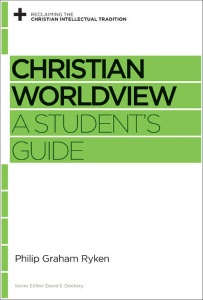Learning to See the World Rightly
I’ve worked with students for a number of years, and I’ve noticed that many have an essentially ‘dualistic’ view of the world.
Overtly ‘spiritual’ things, like prayer, Bible study, evangelism and CU matter, but other activities – including sport, politics and even studies – are essentially superfluous. At best they are neutral activities; at worst they are a distraction to the gospel.
As the president of Wheaton College, a Christian university in the USA, Philip Ryken clearly wants students to take a distinctively Christian approach to their studies – and all of life. To that end, he has penned Christian Worldview: A Student’s Guide, which is in Crossway’s ‘Reclaiming the Christian Intellectual Tradition’ series.
Seeing the world rightly
 To see the world rightly requires seeing it through the right lens and categories, and so Ryken asks a couple of important questions:
To see the world rightly requires seeing it through the right lens and categories, and so Ryken asks a couple of important questions:
Does our way of looking at the world correspond to the world as it actually is? Do we see the world as it is according to God? (30)
The premise of the book is that
it is somewhat doubtful whether most Christians have any very clear understanding of the worldview that belongs to them by the grace of God. (31)
This shortfall not only leaves Christians intellectually vulnerable but also ill-prepared to make wise life decisions.
In order to truly see the world rightly, we need to understand that we are part of a great drama – and so Ryken introduces his readers to the four great stages of history. Understanding that everything within the universe – including all of humanity – is enveloped within this narrative allows us to
gain God’s perspective on why any particular thing was made in the first place (creation), what has gone wrong with it (the fall), how we find its recovery in Jesus Christ (grace), and what it will become in the end, when everything is made new (glory). (34)
Everything for God’s glory
The conviction that absolutely everything finds its place within the Christian worldview lays the ground for the book’s great strength. Ryken reveals the sheer diversity of areas Christians can (and should) take interest. After all,
if God created everything good, then his people cannot restrict their faith to private religion but must pursue his purposes in every sphere of life, whether public or private. Christianity is a world-affirming worldview that embraces the entire creation as a gift from God. (52)
Many Christians might be amazed to realise that a vast number of areas in which they’d thought God had little interest can be arenas in which they can bring glory to God. This includes studies, work, care for the creation, as well as ‘hiking through the woods, playing tag with children, sailing a boat [or] knitting a scarf’ (56).
People of the new creation
The fall means that all seems lost – each and every area that was originally good in creation is left deeply cursed and broken by humanity’s rebellion against God. Indeed, so deep is the fracture that we cannot ultimately help ourselves. Only through faith in Christ can individuals be reconciled with God, and we are made part of a new community – the church – who are together forgiven in Christ. And the church is a people with a mandate from God:
Together we go out to extend the kingdom of God – that is to say, the rule of God – by sharing the good news about Jesus Christ and serving people who are suffering the debilitating and alienating effects of the fall. As people of the new creation, we live out our faith in the ruins of the first creation. (81)
Indeed,
God’s redemptive grace is working in us and through us to restore all the things that were given in creation but lost in the fall. His purposes for redemption are as extensive as his purposes were in creation. (86)
Through the work of Jesus, we are being remade to honour God with our brains, our bodies, in our families, in our corporate worship services, in our communities and in our vocations, amongst other spheres.
The greatest hope
But the focus of our greatest hope is ahead of us: the return of Christ. On that day, justice will be done – giving ‘eternal significance to all our words and actions’ (93). Only then will creation be all God it intends to be; only then will we be all God intends us to be:
In bodies raised and glorified like the immortal body of Jesus himself, we will enjoy resurrection life to the full, body and soul. (96)
Relationships will be put right and we will worship God wholeheartedly in his creation, using all of the potentialities God gave us at creation. Ryken speculates what this could mean for the pursuit of science and art in the new creation. But above all, our greatest hope is being with God forever: ‘that was God’s goal for us from the beginning: that we would know the joy of worshipping him’ (99). Ryken brings out something of the wonder and majesty of that marvellous day.
students will come away with a bigger gospel and a deeper understanding of the true humanity Christ restores in his people.
There is much to appreciate in Ryken’s introduction to the Christian worldview, and I could imagine placing it into the hands of certain students who would benefit from the grand canvas onto which Ryken paints Jesus’ work. It is hard to imagine how a student would not come away with a bigger gospel and a deeper understanding of the true humanity Christ restores in his people.
What’s unfortunate, though, is the pitch of the book. Ryken’s language often operates at a high register, and does not provide many concrete examples of the principles he describes being worked out. This makes the book theologically dense in places, and it is probably out of reach – at least as a first port of call – for many British undergraduates. Julian Hardyman’s Maximum Life (IVP, 2009) is a better bet for achieving a similar end, freeing students to live all of life to the glory of God.
Philip Graham Ryken. Christian Worldview: A Student’s Guide. (Crossway, 2013). 128pp



